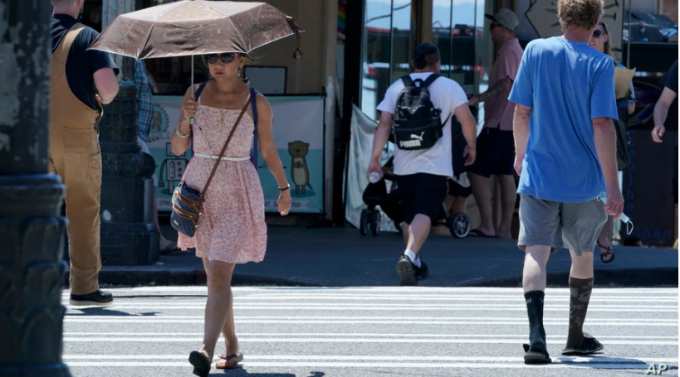November 28, 2025 | 00:45 GMT +7
November 28, 2025 | 00:45 GMT +7
Hotline: 0913.378.918
November 28, 2025 | 00:45 GMT +7
Hotline: 0913.378.918

A women uses an umbrellra for shade from the sun while walking near Pike Place Market, June 29,2021, in Seattle.
More than 60 people have died from excessive heat in the Pacific Northwest during the past week, as soaring temperatures hit a region unacclimated to their deadly consequences.
In Oregon, 63 people have died since Friday, the State Medical Examiner's Office said. That number includes 45 people in Multnomah County, home to Portland, the county medical examiner said.
Many of the deceased were "found alone, without air conditioning or a fan," the examiner's officer said in a statement. "For comparison, for all of Oregon between 2017 and 2019, there were only 12 deaths from hyperthermia."
Heat-related hospital visits also soared in Oregon, where the state recorded 250 visits on Monday. The same day, Royal Canadian Mounted Police received 25 sudden-death calls in western Canada in less than 24 hours. Two people, ages 65 and 68, died from overheating in the Seattle area. In nearby Snohomish County, three men between the ages of 51 and 77 died from heatstroke. In Spokane, Washington, two people were found dead Tuesday in their apartments in apparent heat-related deaths.
The Occupational Safety and Health Administration is investigating a case Saturday in Oregon, where a farm worker was found unresponsive and later died. Dozens of other deaths likely tied to heat in the region are under investigation, and a farmworker union is urging Washington state cherry growers and the governor to protect workers who are picking cherries in more than 110-degree heat.
Heat waves' deadly effects are not novel. A 1995 heat wave in Chicago killed 739 people, sparking many cities to create action plans for keeping residents cool. Now, when a heat wave is forecast, cities used to such events will spring into action, opening cooling centers, extending community center hours, sending alerts warning residents of the impending heat and telling people to stay in air-conditioning as much as possible.
But this heat wave is affecting a region used to cool temperatures. Among the top 15 metro areas, more Seattle residents live without air conditioning than the other 14. The average high in Seattle in June is 71 degrees.
“We cannot just turn up the AC,” Washington Gov. Jay Inslee wrote in an op-ed Tuesday in the Seattle Times. “We have to turn up our level of efforts fighting the underlying cause of our changing world — climate change.”
Climate change will make heat waves more common and more intense, even in places where people are used to staying cool.
“Seattle just set an all-time heat record of 104 degrees Fahrenheit — in June… People across the state suffered with it, and several drowned trying to escape it,” Inslee, a Democrat, wrote.
On MSNBC, Inslee put it plainly: ““We are not meant for this.” He said the heat wave not a moment to overcome but the beginning of a “permanent emergency.”
“This was a true health crisis that has underscored how deadly an extreme heat wave can be, especially to otherwise vulnerable people,’’ Multnomah County Health Officer Dr. Jennifer Vines said in a statement. "As our summers continue to get warmer, I suspect we will face this kind of event again.’’
For some Washington residents, the change is particularly unwelcome.
“Part of the reason I moved here was not only to be near my daughter, but also to come in the summer to have relief from Arizona heat,” Stanlie James, who moved to Seattle less than a month ago, told the Associated Press.
(CNBC, AP)

(VAN) A new study reveals how the simultaneous effects of ocean acidification, salinity and loss of oxygen are making the world more fragile.

(VAN) Hopes are growing that the creation of the first 3D turkey gut model could be a turning point in the battle against the virulent blackhead disease.

(VAN) Tyson, America’s biggest meat supplier, plans to shutter one of its largest beef processing plants as the industry continues to struggle with low cattle supplies and political pressure from Washington.

(VAN) New FAO study shows how digital solutions are empowering farmers and fishers to prevent losses and build resilient agrifood systems.

(VAN) Brazil's COP30 presidency pushed through a compromise climate deal on Saturday that would boost finance for poor nations coping with global warming but that omitted any mention of the fossil fuels driving it.

(VAN) Poultry farmers in the UK have been warned that they could face one of the worst winters yet for bird flu.

(VAN) Prices of main-crop paddy have risen sharply, with jasmine rice hitting 16,100 baht per tonne — the highest level in years.